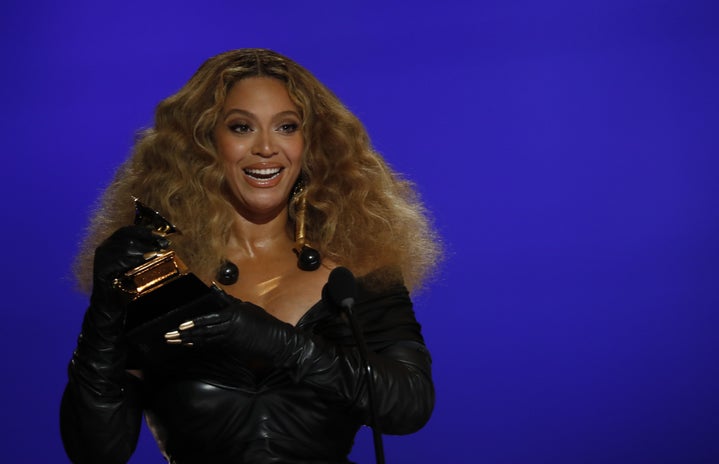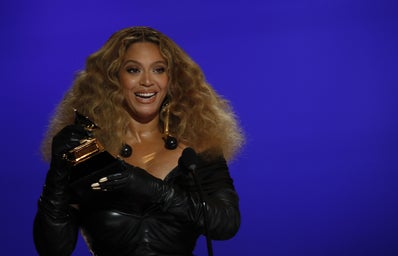Renaissance by Beyoncé is a feat of imagination, daydreaming about partying in the pandemic, capturing the feeling of thinking about all the places you wish you could have gone when you were just stuck in the crib. Beyoncé’s seventh album is not just a pop star’s immaculate dance record, but a rich celebration of club music and its sweaty, emancipatory spirit. She finds escape, rebirth, community, pleasure, and control in decades of dance music steeped in Black queer bravado.
When the pandemic hit, Beyoncé caught on to what her fans missed most: the unfettered joy of gathering together in the club, rolling faces, and sweating as a collective body. As our biggest pop stars increasingly turn to dance music for inspiration, Beyoncé focused her famous work ethic on the nuances of club culture for a challenging, densely-referenced album that runs circles around her similarly minded, Billboard-charting peers.
She dedicated the album to her “godmother,” Uncle Jonny, who died of complications stemming from HIV, and to the “pioneers who originate culture… the fallen angels whose contributions have gone unrecognized for far too long.”
For nearly a decade she has made pop music on her terms, uninterested in the dusty edicts of the music industry, and pointed out her intended audience; now pop fans bend to Beyoncé, not the other way around. All 16 songs hail from someplace with a dance floor — nightclubs, ballrooms, strip clubs, and basements.
Renaissance is inherently about bodies undulating in the dark, under strobes; sexual agency; and the Black, queer, and trans women who are the most politicized and the most endangered people among us. As the physical movement was necessarily constrained during pandemic isolation, the dissociative effects of being unseen became both detrimental and liberating. Renaissance is a commanding prescription to be perceived again, without judgment. Listening to the album, you can feel the synapses coming back together one by one, basking in the unfamiliar sensation of feeling good, if only for its hour-long duration.
Dance music necessarily centers on the immediate present—the seconds ticking along during the transcendent act of unleashing on a dancefloor—but it thrives on the fluidity of sampling, of elder respect, and of reimagining classic sounds to invent the new.
The stunning “Pure/Honey” alone braids together decades of ballroom, taking samples from ’90s club hits by drag icons: Kevin Aviance’s hit “Cunty,” from 1996, and Moi Renee’s “Miss Honey,” from 1992. It also nabs a bit from “Feels Like,” a 2012 track by MikeQ, legendary ball DJ and DJ for HBO’s Legendary, and Kevin Jz Prodigy, the ball commentator and musician whose vocals—“cunt to the feminine what”—lead the song. That’s years of history in just one song and just one magnifying-glass example of the ways Beyoncé uses Renaissance to put some respect on these club legends’ names.
Another history is right there in the album’s title: 100 years ago, when things were also too much for Black Americans — lynchings, “race riots” all over the country — and flight north from the South seemed like a sound alternative to murder, up in Harlem, Alain Locke and Zora Neale Hurston and Langston Hughes and Aaron Douglas and Jessie Fauset, to pick five figures, were at the center of an explosion of art that could be as frivolous, party-hearty and vulgar as some of what’s on this album. Its artists were gay and straight and whatever was in between. The point is they called that a renaissance, too. It sustained and delivered delight and provocation despite the surrounding crisis, it gave people looking for a house something that approximates home. New salvation, old foundation.
Renaissance reinvents Beyoncé, and she trusts that her fans will be up for the challenge. She is 40 years old, the age society at large tends to start writing women artists (and women in general) off as creatives who still have something to offer, but she refuses to submit to that, making herself impossible to ignore. “I’ve been up, I’ve been down,” she sings on “Church Girl,” “Felt like I move mountains/Got friends that cried fountains.” It’s the most plaintive moment on the album, and then, in full Beyoncé fashion, she comes back more determinedly: “I’m gonna love on me. Nobody can judge me but me.” It’s a transcendent, beautiful, deceptively simple moment. She extends a diamond-encrusted, gloved hand—an invitation to a better kind of party.


